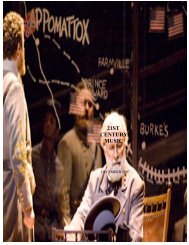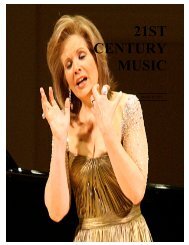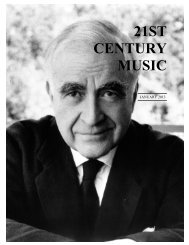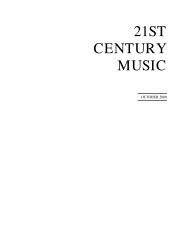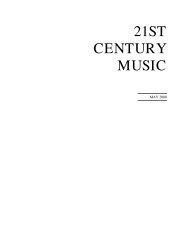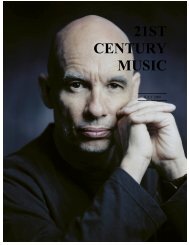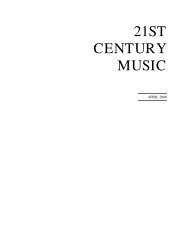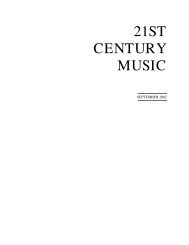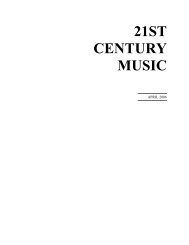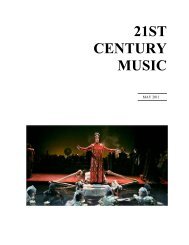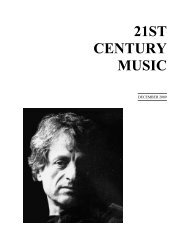You also want an ePaper? Increase the reach of your titles
YUMPU automatically turns print PDFs into web optimized ePapers that Google loves.
Even though the composer remained more reticent than most,<br />
it was hard not to ask Hovhaness how he managed to compose<br />
so much. He started with "an idea" (pronounced "idear," in the<br />
Boston way), which may have been an instrumental sound or a<br />
long melodic line. "It usually comes when I'm waking in the<br />
morning. I've been dreaming about it, and I try to get it down<br />
on paper before it vanishes. Also, while working I get tired. I<br />
suddenly have to lie down and go to sleep, a few minutes or<br />
just a few seconds. I hear the music. I wake up and write it<br />
down. I like to feel possessed, because that's the only time it's<br />
really worth it." He showed me one of the cheap notebooks he<br />
always carried with him. "I have a tremendous amount of<br />
books filled with melodies like that. I never go back to them.<br />
Usually I don't use them right away, because something else<br />
takes over." Had his music changed much in the past few<br />
decades "No. It either is there or it isn't." As Dennis Russell<br />
Davies put it, "He is one of those few composers, Mozart must<br />
have been another, for whom composing isn't hard."<br />
Hovhaness appeared in touch with passions not available to<br />
most people. He told me that one night during his recent<br />
hospital stay he pulled out all the tubes attached to his body,<br />
including the IV-feeder and the catheter. "I thought I'd landed<br />
some place outside the opera house somewhere. Bums were<br />
getting together and singing and performing all kinds of<br />
things. I thought I was there for a while. Then someone put me<br />
in a car, an old-fashioned car, which we may have had for a<br />
while." Then he was subdued by large orderlies and tied down<br />
at night. "He was the wildest one they ever had," his wife<br />
affirmed, complimenting her 79-year-old husband's energy.<br />
While hospitalized, he managed to write a solo viola sonata<br />
with several movements!<br />
At another point he told me of "peak experiences," as they've<br />
been called: "When composing was interrupted by sleep, I<br />
dreamed a whole section of music. A month later, while I was<br />
working, I again went to sleep in the same place and dreamed<br />
the music again. I realized I had written the music wrong. This<br />
is the experience of Mysterious Mountain." While he sipped<br />
hot coffee, his wife recalled, "I can tell where it is. That<br />
passage is such a haunting mood. No way I can miss it." She<br />
paused, "He's in tears every time."<br />
He continued, visibly choking, "It is such a cosmic experience.<br />
I can't express it. So whenever I heard that passage, I used to<br />
leave the concert hall. I was afraid people would think I was<br />
crazy. I stayed in the lobby. I got locked out one time, when<br />
the piece was over. Because the doors locked behind me, I<br />
never got to the stage." The critical question was whether<br />
Hovhaness had a more profound grasp of nature as such or<br />
with, as I think, whatever that human power is that produces<br />
music If the latter, should we regard his work as metamusic<br />
"It is hard to say why I write tonal music. I write what I have<br />
to write. I'm forced to write it by a tremendous force, and it's<br />
not worth doing otherwise. Tonal music includes all the music<br />
of the Greeks, all the music of India, all the music of ancient<br />
Armenia, all the music of Japan, all the humanistic music of<br />
the world." What is humanistic "Related to inner singing. I<br />
can't do anything I'm bored with. I have to have my spirit<br />
completely absorbed by it, or I don't want to bother with it. I<br />
can't give my time to anything that doesn't really affect me<br />
deeply. I'm not sure what words like 'tonal' mean anymore.<br />
What are the boundaries between tonal and nontonal." He<br />
paused. "Composers who write melodies are tonal composers<br />
and those who don't are not." To Davis, "His heartfelt<br />
commitment to tonality represents a philosophical statement."<br />
Hovhaness pieces come in all sizes, from short songs to fulllength<br />
operas (which he lamented are rarely performed). As a<br />
melodist, he was prepared to write for every sort of<br />
instrument. He has the richest catalogue of any contemporary<br />
composer. Because of "the authenticity of a voice that he's<br />
pursued for a lifetime," in Davis's phrase, nearly every<br />
Hovhaness work can, after a few bars, be identified as his.<br />
They are performed everywhere, by amateurs as well as<br />
professionals. His collection agency, BMI, counted over 1,000<br />
performances during a single year (while you can be sure that<br />
many amateur performances went unnoticed). Indeed, few<br />
living composers are performed so widely. The closest<br />
semblance to a catalogue is Richard Howard's The Works of<br />
Alan Hovhaness (White Plains: Pro/Am <strong>Music</strong> Resources),<br />
which follows the composer's work only to 1983 and Opus<br />
360, including 50 symphonies. At last count, there were at<br />
least 70 more pieces (including 14 additional symphonies).<br />
As an unfashionable contemporary, Hovhaness's music rarely<br />
appears on the so-called major labels that are distributed to<br />
America's record stores. Indeed, for a while his recording<br />
situation was so unfortunate that he cofounded Poseidon<br />
Records to make his work public. Though they were slow to<br />
appear on compact discs, by now many of his very best works<br />
are on the current format. In addition to the CD mentioned<br />
before (<strong>Music</strong>Master NMD 60204K), the Saint Vartan<br />
Symphony (Symphony No. 9) and Vishnu (Symphony No. 19)<br />
are now available on CDs from Crystal Records (2235 Willida<br />
Lane, Sedro Wooley, WA 98284), which has issued six CD's<br />
entirely of Hovhaness's music, in addition to distributing<br />
Hovhaness pieces over CD's that include other composers'<br />
works as well. Crystal also offers the Poseidon Records<br />
mentioned before. Nonetheless, Hovhaness records continue<br />
to appear on other labels, including Fujihara (P.O. Box 88381,<br />
Seattle, 98188-2381), which has his wife as coloratura soloist<br />
in Symphony No. 38 (Opus 314). One of my favorite records<br />
has the composer performing his pieces for solo piano,<br />
Shalimar (Fortuna, P.O. Box 32016, Tucson, AZ 85751). The<br />
principal publisher of his scores has been C. F. Peters, though<br />
many pieces have appeared under other imprints, including<br />
Fujihara.<br />
17



